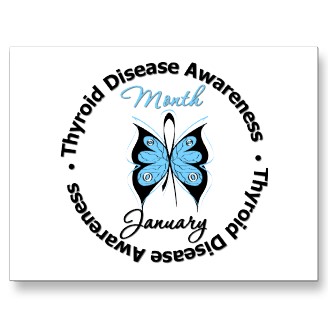January is Thyroid Disease Awareness Month so it’s a great time to learn more about this tiny but important gland. According to Medicinenet.com, one in five women over the age of 65 have some form of thyroid dysfunction.
What does the thyroid do? The thyroid creates hormones and sends them to all your body’s tissues. Thyroid hormones help the body use energy, stay warm and keep the brain, heart, muscles, and other organs working.
Thyroid disease can present a confusing array of symptoms in adults over age 60. Symptoms like heart flutter, weight loss, weight gain, hand tremors, dry, itchy skin, constipation, depression and memory loss. Some of these symptoms can be mistakenly attributed to heart, bowel or nervous system disorders.
Most thyroid problems occur when the gland makes too much, or too little thyroid hormone. Fortunately, a simple blood test can determine whether your thyroid gland is functioning properly, and if you need treatment.
Hypo-active Thyroid
If your thyroid cannot make enough of the hormone Thyroxine, it is underactive and you have Hypothyroidism. An inexpensive, synthetic version called levothyroxine is used to treat an underactive thyroid. Levothyroxine is identical to the body’s natural hormone and is very effective in restoring normal thyroid hormone levels.
According to Goodrx.com, levothyroxine was the most prescribed medication in the United States with more than 114 million prescriptions in 2016. And, while millions of Americans are being treated for hypothyroidism, there are likely millions more who have not been diagnosed. It is far more common in people over age 60.
Symptoms vary, and you might have only one, such as weight gain. As the body slows, you may feel colder, tire more easily, have drier skin, or become forgetful and depressed. You may have started to be constipated.
Hyper-active Thyroid
By contrast, Hyperthyroidism means your thyroid is overactive. In that case, every function of the body tends to speed up. Not surprisingly, some of the symptoms of hyperthyroidism are nervousness, irritability, increased sweating, heart racing, hand tremors, anxiety, difficulty sleeping, thinning of your skin, fine brittle hair and weakness in your muscles.
About one percent of the U.S. population produces too much thyroid hormone (National Institutes of Health), and women are much more likely to develop hyperthyroidism.
There are several causes of excess hormone production. The most common is a condition called Grave’s Disease, in which antibodies in the blood cause the thyroid to grow and secrete too much hormone.
A less common cause is the presence of nodules on the thyroid gland, which can grow and secrete extra hormone into the blood. In this case, the thyroid itself is not overactive.
Testing thyroid hormone levels, measuring antibodies, and scanning the gland are ways to diagnose hyperthyroidism. Treatment depends on the cause of the excess hormones, and might require anti-thyroid medications, or radioactive iodine to shrink nodules.
While younger adults often have multiple symptoms related to overactive thyroid, older individuals may only have one or two. For example, you might experience only a sensation of heart flutter, and some chest discomfort on climbing stairs. Or, you may be disinterested in, or withdraw from social interaction.
Treating hyperthyroidism is perhaps more important for older adults than for younger people. In people over age 60, hyperthyroidism increases the chance of developing a rapid, irregular heartbeat, known as atrial fibrillation-a condition that may lead to heart failure or stroke. Untreated hyperthyroidism can also speed the bone-thinning disease osteoporosis.
How to Know for Sure
Both hypothyroidism and hyperthyroidism can initially be diagnosed with thyroid function tests, to measure the levels of thyroid-stimulating hormones (TSH) in your bloodstream. TSH is made by the pituitary gland, located in the brain.
High levels of TSH indicate that your little powerhouse is not making enough thyroid hormone. A low TSH level usually indicates that it is producing too much.
So, as you start 2020, check in with your thyroid. It may be telling you something! Healthy aging is important!
The information in the above article is not intended nor implied to be a substitute for professional medical advice, diagnosis, or treatment. Always seek the advice of your physician or other qualified health provider with any questions you may have regarding a medical condition.
